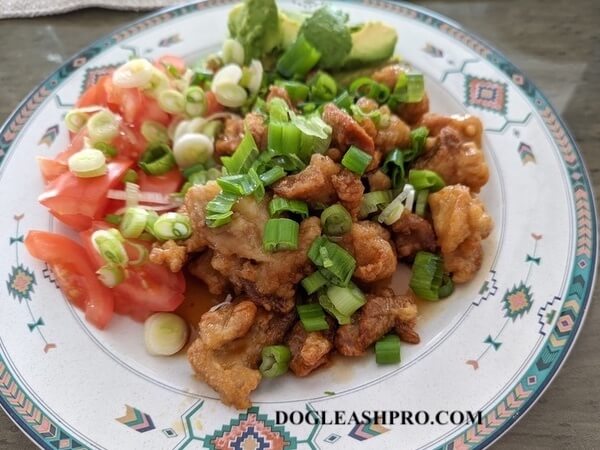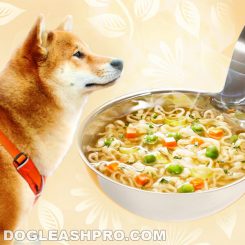
It’s been a long day and you decided to order Panda Express Orange Chicken. While you’re enjoying your sweet and tangy meal, your dogs come over and beg for some. They look at you with their puppy eyes, lick their nose, and wag their tail. You’re about to share one but wondered if Orange Chicken is safe for doggy consumption. Here’s the brief answer first.
Can dogs eat Orange Chicken? No, dogs should not eat Orange Chicken since some of the ingredients used to make the Orange Chicken sauce are toxic and harmful for dogs. While one or two pieces of Orange Chicken are fine for doggy consumption, eating too many can lead to health issues such as diabetes, obesity, salt poisoning, and even pancreatitis due to the high amount of sugar, fat, salt, and calories in Orange Chicken.
Since dogs don’t see color, Orange Chicken simply looks like Chicken Nuggets to them. In this article, we’ll discuss in-depth why our four-legged friends should stay away from this sweet yet tangy food. Let’s begin!
Table of Contents
Can dogs have Orange Chicken?

No, dogs should not have Orange Chicken because the Orange Chicken dish is made of battered dark meat Chicken and the sauce contains salt, spices, sugar, and soy sauce. These ingredients used to make Orange Chicken are not considered canine-friendly.
Let’s backtrack a little bit and take a look at what this dish entails and the typical ingredients used to make Orange Chicken.
What is Orange Chicken?

You can find the Orange Chicken dish in many Asian fast-food restaurants such as Panda Express. It is small bite-sized dark meat Chicken pieces (sometimes white meat Chicken) that have been battered and fried until it is crispy.
After the frying process, the battered fried Chicken is then coated in this sweet, tangy, and sticky orange and chili sauce, which is how this dish got its name – Orange Chicken.
The primary ingredients used to make Orange Chicken include the following:
- Skinless dark meat Chicken (sometimes white meat Chicken if you’re making it’s homemade).
- Black pepper.
- Salt.
- Wheat flour.
- Cornstarch.
- Egg.
- Oil.
- Sugar.
- White distilled vinegar.
- Sesame oil.
The primary ingredients used to make the sauce in Orange Chicken include the following:
- Soy sauce.
- Orange juice or orange extract.
- Ginger.
- Garlic.
- Chili flakes.
You may be interested in: Can Dogs Eat Chicken Skin? (Raw, Cooked & Fried)
As we can already see, some of these ingredients use to make the sauce and the Orange Chicken are not safe for doggy consumption. Let’s go through each of these ingredients and see how they negatively affect our dog’s health.
Is Orange Chicken bad for dogs?
Yes, Orange Chicken is bad for dogs and canine owners should avoid feeding their pooch Orange Chicken.
Here’s why.
Dark meat Chicken in Orange Chicken may lead to pancreatitis in dogs
When you compare white and dark Chicken meat, the difference between the two is that dark Chicken meat is more decadent and flavorful, which is why it can be extremely rich and fatty for our fur babies’ stomachs.
Most veterinarians caution against feeding your K9 friends dark Chicken meat since feeding your pooch rich, fatty food regularly (dark Chicken meat in this case) can cause your dog’s pancreas to become swollen and inflamed and this can lead to pancreatitis.
Pancreatitis is very serious, painful, and life-threatening. Signs and symptoms of pancreatitis include:
- Vomiting repeatedly (once every hour or over a few days).
- Diarrhea.
- Loss of appetite.
- Fever.
- Hunched back.
- Dehydration is due to the inability to keep water down.
- Lethargy.
- Muscle weakness.
- Abdominal pain.
- Bloating.
If you suspect your K9 pals have pancreatitis, call your vet immediately as this requires immediate medical attention.
Fun Fact: Did you know that there are many different dog vomit types? Depending on the color and texture of the dog vomit, it can give you an idea of why your furry friend is throwing up or feeling sick. For more information, check out Dog Vomit Color Guide to learn more. You’ll want to bookmark this page for future reference!
Orange Chicken may contain bones which can lead to choking and bowel obstruction in dogs
Some Orange Chicken contains bones and since it is cooked, this makes Orange Chicken dangerous for our canine friends. While raw bones are great for dogs to chew, cooked bones are not.
Cooked bones can break very easily when your furry friends chew them and can also splinter very easily as well. The sharp shard from the cooked bones can pierce your dogs’ lips, tongue, cheek, and even the roof of their mouth while they’re trying to chew them.
If your pooch tries to swallow the cooked bone, it can get stuck in his throat and esophagus and cause your pooch to choke.
If your pup does manage to swallow the sharp pieces of bones from the Orange Chicken, he or she may have to endure internal bleeding since the sharp bone shards can tear the soft tissues in the throat or even pierce your dog’s esophagus. Ouch!
In some cases, pieces of bones can even get into your dog’s trachea (windpipe), which can make it very hard for him or her to breathe.
Sometimes dogs get very excited and they forget to chew their food before swallowing. Some Orange Chicken may contain small bones inside and when your pooch tries to swallow, the Orange Chicken may get stuck in your dog’s throat which is another choking hazard.
If the small bones do manage to make their way to the stomach and intestine, they can cause stomach and intestinal blockage and this can lead to bowel obstruction.
Bowel obstruction is when there is something (bones in this case) that causes partial or complete blockage in your dog’s stomach and intestines. When this happens, it prevents both solids and liquids from passing through to the gastrointestinal tract.
This blockage is very dangerous because it can cause the following to happen:
- Reduce blood flow throughout the body.
- Lead to deterioration of the bowels.
- Absorb toxic content.
In the worst-case scenario, some bowel obstruction cases may require immediate abdominal surgery or endoscopy. Bowel obstruction is very serious. If you notice any of the below signs and symptoms of bowel obstruction, contact your vet immediately as this requires immediate medical attention and treatment.
Signs and symptoms of bowel obstruction in dogs include:
- Repetitive vomiting.
- Diarrhea.
- Dehydration because your dog keeps throwing up both water and solid food.
- Loss of appetite.
- Lethargy.
- Muscle weakness.
- Stomach irritation.
- Abdominal pain.
- Bloating.
- Whining.
- Hunching.
Additionally to causing stomach and intestinal blockage, the sharp fragments of the cooked bones can puncture the dog’s stomach and intestinal lining and cause internal tearing, bleeding, and leaking.
When the stomach and intestine walls are torn or damaged, it can cause food and other intestinal content to leak into the dog’s abdomen. This can cause a fatal condition called peritonitis, which is an abdominal infection. In some cases, treating this condition aggressively may not help.
With that said, it’s important to remove any bones (large or small) from Orange Chicken or any chicken before feeding it to your four-legged friends.
You may also like: Can Dogs Eat Chicken Noodle Soup?
High salt levels in Orange Chicken can cause sodium poisoning in dogs
While this may not be so obvious, it’s important to note that Orange Chicken contains high levels of sodium. Most Orange Chicken dish contains more than 600mg of sodium. While this may not seem like a lot of salt for us, it is considered a lot of salt for our precious pooch.
In fact, dogs should only have between 0.25 grams and 1.5 grams of sodium per 100 grams of food. Keep in mind that our K9 friends should receive their salt intake from their regular well-balanced and healthy food.
Any extra salt intake outside of their main meal such as snacks or treats would only add to their salt intake limit.
If your pooch already received enough sodium for the day, giving them Orange Chicken as a snack or treat is a bad idea. That’s because 600mg of sodium in just one serving (or 5.7 ounces) of Orange Chicken would convert to 0.6 grams of salt. That’s a lot of salt for our precious pooch!
This can cause sodium poisoning in dogs. Signs and symptoms of salt poisoning in dogs include:
- Swollen tongue.
- Dehydrated and extremely thirsty.
- Frequent urination.
- Vomiting.
- Nausea.
- Watery and loose diarrhea.
- Loss of appetite.
- Confusion.
- Headache.
- Fluid buildup.
- Convulsions.
- Breathing difficulty or respiratory distress.
- High fever.
- Tachycardia or fast heart rate.
- Muscle spasms.
- Muscle weakness.
- Abdominal pain.
- Upset stomach.
- Lethargy or lack of energy.
RELATED: My Dog Is Acting Drunk And Wobbly – Should I Be Concerned?
If you suspect your pooch has sodium poisoning, be sure to contact your vet as soon as possible. Your vet may ask you to bring your dog in for a physical and thorough check-up.
As soon as your pooch reaches the veterinary office or hospital, you’ll want to inform the vet how much salt your furry friends consumed and how long has it been since he ingested the Orange Chicken.
Your vet will then perform a series of examinations such as checking your dog’s pulse rate, temperature, blood pressure, reflexes, respiration, temperature, hearing, vision, height, and weight.
To confirm that your dog has sodium poisoning, your vet will also need to perform a urinalysis, blood count, blood chemistry, and blood gases. Sometimes a cardiac examination or an electrocardiogram (EKG) may also be performed.
If your pooch is dehydrated, the vet may administer IV fluid therapy and electrolytes to manage the dehydration. Depending on how much salt your dog ingested from the Orange Chicken, the vet may require your four-legged friend to stay overnight at the hospital.
That’s because the salt level will need to be brought down slowly and gradually. A sudden change in your dog’s sodium level can cause brain swelling and even a heart attack.
Too much sugar in Orange Chicken can lead to diabetes in dogs
Orange Chicken contains lots of sugar and too much sugar consumption can lead to a host of health issues in dogs including diabetes, upset stomach, dental issues, metabolic changes, and weight gain.
Dental disease
Just like us, our four-legged friends can also get cavities from eating too much sugar. However, it’s even worse for our dogs. The bacteria in their mouth use the sugar stuck on their teeth and gum to produce acids.
These acids are responsible for destroying the enamel or the outer coating of your dog’s teeth. When the enamel loses its mineral, your dog’s teeth become more vulnerable to dental disease.
If your fur babies consume a lot of sugar, make sure they have their regular teeth cleaning or dental appointment. It’s never too late to schedule one today.
Upset stomach
When dogs ingest too much sugar, it can upset their stomach because when dogs suddenly consume a high dose of sugar, it can disrupt the balance of good and bad bacteria in their gut. These bacteria or microorganisms in the dogs’ gut are what help them digest the food they eat.
When the balance of microorganisms gets disrupted, it can lead to horrible diarrhea, one that is bloody and explosive. Sometimes, an upset stomach can even cause dogs to vomit.
DISCLAIMER: THIS WEBSITE DOES NOT PROVIDE MEDICAL ADVICE
The information, including but not limited to, text, graphics, images and other material contained on this website are for informational purposes only. No material on this site is intended to be a substitute for professional veterinary advice, diagnosis, or treatment. Always seek the advice of your veterinarian or other qualified health care provider with any questions you may have regarding dietary needs.
Resources:
https://en.wikipedia.org/wiki/Orange_chicken

With over five years of specialized experience as an animal writer, my expertise lies in dog nutrition, health, behavior, grooming, and training. I am dedicated to delivering helpful and informative content that caters to the well-being of our furry friends. My primary goal is to empower pet owners with knowledge and ensure our canine companions thrive in health and happiness. In my free time, I love volunteering at local dog rescue centers.







